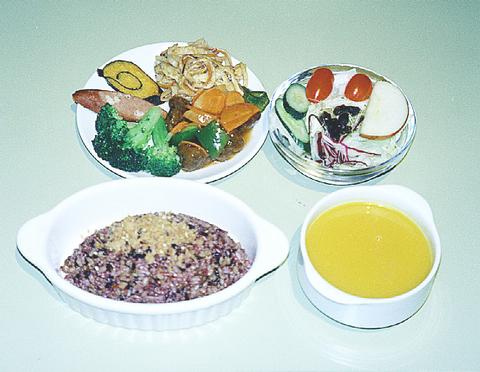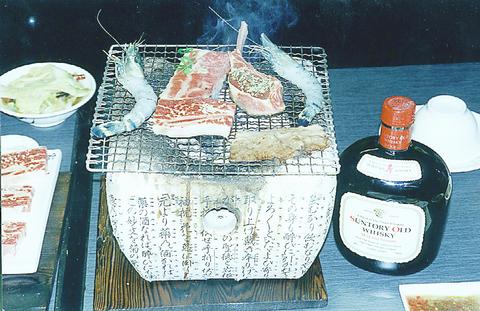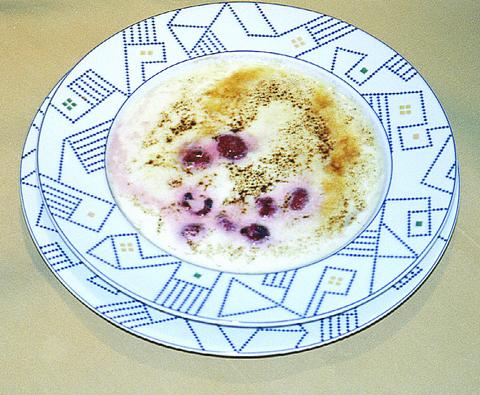Olive Tree
(Olive Tree 地中海式餐廳)
Imperial Inter-Continental Hotel Taipei, 2F, 600 Lin Shen N. Rd. (台北市林森北路600號台北華國洲際飯店二樓)

PHOTO: CHANG JU-PING
Tel: 25965111 ext. 2702
Open 11:45am-2:30pm; 6:00pm-10:30pm.
Average meal: NT$600. English menu. Credit cards accepted.

PHOTO: CHANG JU-PING
It may be premature to say that if the food looks good, it tastes good, but the dishes at this cozy restaurant, opened on April 25, look truly delicious. And best of all, the food measures up to its presentation, with a natural, non-greasy, and carefully-seasoned taste. In the short time it's been open, Olive Tree has become popular, particularly among female diners who shun overpriced "hotel restaurants."
Chef Tom Hsieh (謝宜榮), who has extensive experience at five-star hotels like Grand Hyatt Taipei and Grand Formosa Regent Taipei, says his catering includes authentic Mediterranean dishes. Hsieh does not try to produce overly sophisticated cuisine and people can make these typical Mediterranean dishes at home using the four cookbooks Hsieh has published.
The mezze buffet features over 25 dishes dishes. The cous-cous salad makes use of North African rice and zucchini prepared in Moroccan style. Hsieh also recommends the provencal potato salad. Other restaurants use mayonnaise in this dish but Hsieh opts instead for parsley, chicken and mustard to enhance the dish in a typical French style. Hsieh says his dishes are rarely found elsewhere, and usually are mixed with a variety of local and imported herbs. If the light dishes at the mezze buffet are not enough, there are also a la carte items with pasta, pizza and main courses to choose from. Seafood dishes are highly recommended. The chef in particularly thinks the Andalousian paella, with its succulent calamari, shrimps, and scallops, is a must try. The desserts are not to be overlooked, especially the raspberry creme brulee.

PHOTO: CHANG JU-PING
E2 Coffee
23, Ln. 240, Kuangfu S. Rd., Taipei(臺北市光復南路240巷23號地之華大廈).
Tel: 2776-3062
Open 7am to 11pm.
Average meal: NT$200. English menu. Credit cards not accepted.
Vegetarians looking for a nice spot to eat now finally have a place to accommodate them. E2 Coffee, opened six weeks ago, has large windows, a well-lit interior and healthy, organic food that makes this city diner wildly popular. Owner Chen Yao-tsung (
Chen emphasizes, however, that E2 is not strictly an organic food restaurant. Along with the organic rice and grains and vegetables are nine types of coffee and 10 types of herbal teas. For those who like a light and fragrant meal, try the cereal rice and vegetables Set. The rice bowl is furnished with a combination of mixed grains and different kinds of rice such as black sticky rice (黑糯米). Those who just can't do without the taste of meat should try the fish steak in Japanese style. The meat imitations are made from tofu and taste wonderful and don't have the fat. For extra pep, try the "miracle energy soup," a staple of most organic restaurants. It's a bit bitter, but is extremely healthy, and purports to restore one's energy. Chen says it is made of various kinds of fibers from vegetables, fruits and nuts. He also recommends finishing the drink within 15 minutes to maintain the freshness of the juice.
Chun-hsi Japanese Yakiniku Restaurant(春喜日式炭燒)
38 Peining Rd., Taipei (臺北市北寧路40號)
Tel: 2570-7793
Open 11:30am-2pm; 5pm-2am.
Average meal: NT$350. No English menu. Credit cards accepted.
Japanese-style barbecue is one of the novel ways of dining available at this chic, monochrome decor restaurant that opened April 1. Lawrence Lu (
Lu offers about 50 items for barbecue, including meat and vegetables. The various kinds of beef are a must try. Kobe is famous for its tender so-called "frost fall beef." There is also wu-hua beef, which has some fat in it for a richer taste. Lu also recommends French lamb chops. The three slices of tender meat are topped with Italian herbs for flavor enhancement. The sour and spicy cabbage is exceptional. An added attraction are several specials associated with the restaurant's grand opening -- buy-one-get-one-free Sapporo beer, free iced tea at noon and free soup all day.
-- chang ju-ping

Google unveiled an artificial intelligence tool Wednesday that its scientists said would help unravel the mysteries of the human genome — and could one day lead to new treatments for diseases. The deep learning model AlphaGenome was hailed by outside researchers as a “breakthrough” that would let scientists study and even simulate the roots of difficult-to-treat genetic diseases. While the first complete map of the human genome in 2003 “gave us the book of life, reading it remained a challenge,” Pushmeet Kohli, vice president of research at Google DeepMind, told journalists. “We have the text,” he said, which is a sequence of

On a harsh winter afternoon last month, 2,000 protesters marched and chanted slogans such as “CCP out” and “Korea for Koreans” in Seoul’s popular Gangnam District. Participants — mostly students — wore caps printed with the Chinese characters for “exterminate communism” (滅共) and held banners reading “Heaven will destroy the Chinese Communist Party” (天滅中共). During the march, Park Jun-young, the leader of the protest organizer “Free University,” a conservative youth movement, who was on a hunger strike, collapsed after delivering a speech in sub-zero temperatures and was later hospitalized. Several protesters shaved their heads at the end of the demonstration. A

Every now and then, even hardcore hikers like to sleep in, leave the heavy gear at home and just enjoy a relaxed half-day stroll in the mountains: no cold, no steep uphills, no pressure to walk a certain distance in a day. In the winter, the mild climate and lower elevations of the forests in Taiwan’s far south offer a number of easy escapes like this. A prime example is the river above Mudan Reservoir (牡丹水庫): with shallow water, gentle current, abundant wildlife and a complete lack of tourists, this walk is accessible to nearly everyone but still feels quite remote.

In August of 1949 American journalist Darrell Berrigan toured occupied Formosa and on Aug. 13 published “Should We Grab Formosa?” in the Saturday Evening Post. Berrigan, cataloguing the numerous horrors of corruption and looting the occupying Republic of China (ROC) was inflicting on the locals, advocated outright annexation of Taiwan by the US. He contended the islanders would welcome that. Berrigan also observed that the islanders were planning another revolt, and wrote of their “island nationalism.” The US position on Taiwan was well known there, and islanders, he said, had told him of US official statements that Taiwan had not